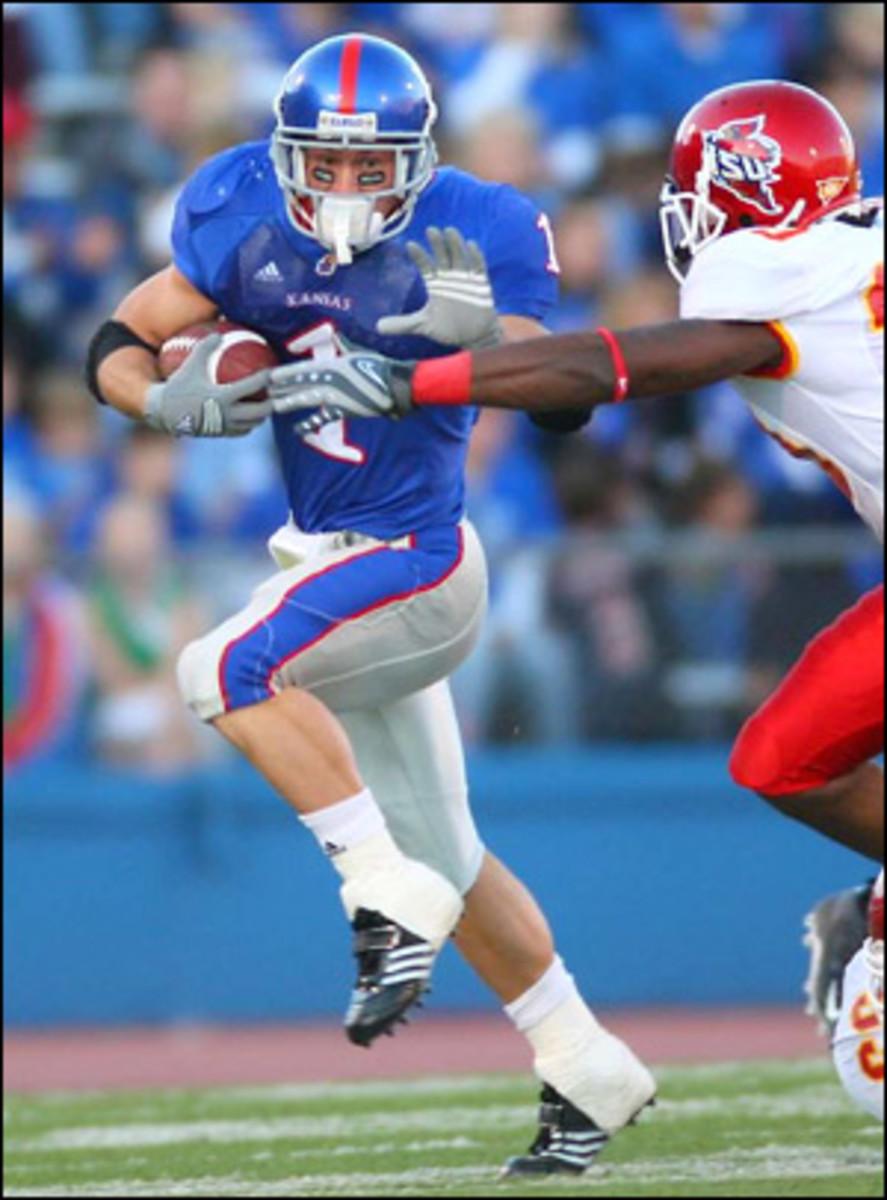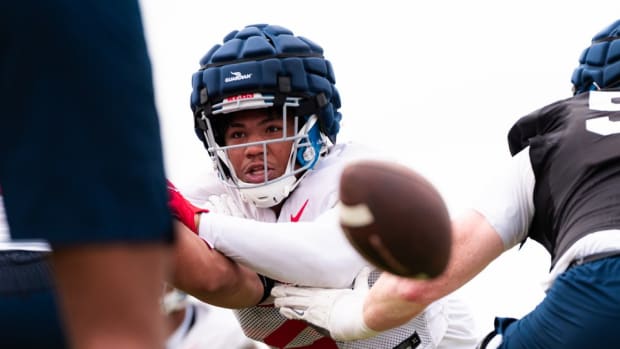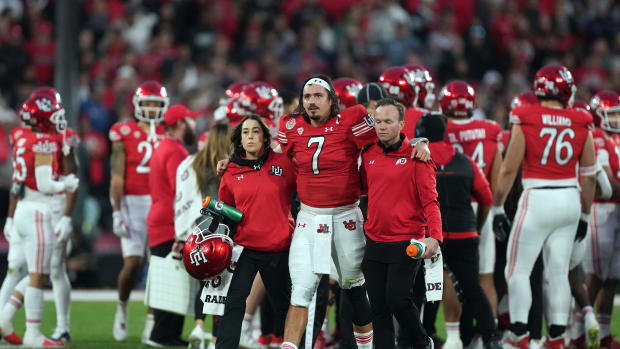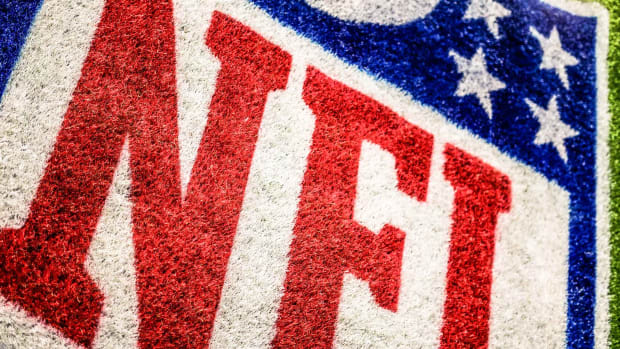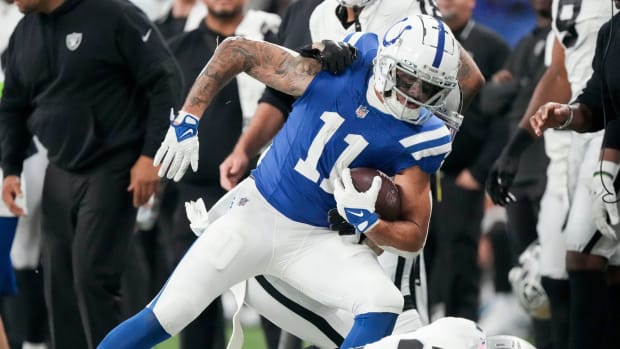They Got Game
The call comes early in the week of the Missouri game. Some years Kansas coach Mark Mangino invites Don Fambrough to say a few words to the Jayhawks players to help get them in the proper frame of mind to face the Tigers. To stoke their outrage, in other words.
Advancing age has not smoothed the rough edges on Fambrough, 85, who put in two stints as the Kansas coach from 1971 through '82. When a visitor remarked recently on the unseasonably mild weather in Lawrence, the old coach agreed, then warned, "You never know around here. In two days there could be snow up to your ass."
If Coach Fam's previous Missouri-week speeches are a guide, he will urge offensive linemen to stay on their blocks for an extra two seconds. He will implore running backs to pump their legs for an extra two yards. He will advise the Jayhawks to spend a little extra time looking at film. Then he'll get to the point. After reminding his audience that the name of the Kansas-Missouri game was changed a few years ago from Border War to Border Showdown, he will raise his voice and pass judgment on that exercise in political correctness:
"Showdown, my ass! When you're playin' other teams, it might be a 'showdown.' When you're playin' Missouri, it's a war! And they started the damn war."
This Saturday, for the 116th time, the Jayhawks will take the field against the Tigers. For once and at long last, the rest of the republic cares about the outcome. In a fitting climax to a surreal regular season Kansas enters the game ranked No. 2 in the BCS, Missouri No. 4. The victor will need only a win in the Big 12 championship game to play for the national title.
The rivalry has stood out down through the decades less for the quality of the football than for the two states' shared history, and the depth and provenance of the ill will. As The Kansas City Star recently pointed out, the Border War nickname was "not a product of the schools' publicity departments." It exists, instead, "because Missourians and Kansans who mostly lived close to the border once waged real war against each other."
In the early 1860s the infamous William Quantrill staged raids along the Missouri-Kansas border and eventually became a captain in the Confederacy. (Kansas was part of the Union.) In 1863 the then Missouri-based Quantrill and 450 of his Raiders attacked Lawrence, slaughtering scores of unarmed citizens and torching parts of the city. Recounting the atrocity, Coach Fam prefers to garnish it with this small fiction: He tells the players, after the massacre "they found out .?.?. [Quantrill] was a Missouri alum!" (When an overly credulous football player included that falsehood on a history exam, the professor phoned Fambrough. "I'll let you coach football," he said, "if you'll let me teach history.")
Despite the genuine enmity underlying it, KU-Mizzou barely makes the B-list of college football's best-known rivalries. There is the Game (Ohio State-Michigan) and the game formerly known as the World's Largest Outdoor Cocktail Party (Florida-Georgia). There is the Red River Rivalry (Texas-Oklahoma) and the Civil War (Oregon-Oregon State) -- all of them rather civil, it turns out, compared with the sport's oldest rivalry west of the Mississippi.
By crisply dispatching Iowa State 45-7 last Saturday, the Jayhawks improved to 11-0. The team that won 12 games, total, from 1986 to '90 could win its 12th game of the season at Arrowhead Stadium in Kansas City, Mo., this Saturday.
By thumping Kansas State 49-32, Mizzou improved to 10-1. The team that had three winning seasons from 1984 through 2004 rose in the rankings thanks to Oregon's loss at Arizona and Oklahoma's defeat at Texas Tech. In this year's Border War, the malice has meaning. Not for the first time. But for the first time in a long time.
It's not as if Mizzou hasn't won 10 games in a season before. It happened as recently as 1960. The Tigers were 9-0 and No. 1 in the nation when Kansas came to town. Their backfield stacked with future pros John Hadl, Curtis McClinton, Bert Coan and Doyle Schick, the Jayhawks upset the Tigers 23-7. But Coan, it turned out, had accepted a plane ride from a KU booster the summer after his freshman year. Missouri athletic director Don Faurot pressured the Big Eight, and the Jayhawks were told to forfeit the game. (Kansas acknowledges the forfeit in its media guide but counts the game as a win in the series, which, when you award the '60 game to Missouri, stands at 53-53-9.) Faurot's treachery -- to this day, Jayhawkers see it as such -- carried over to basketball season. So vociferously were the Tigers booed at Allen Fieldhouse the following January, "they couldn't introduce the teams or play the national anthem," recalls Norm Stewart, an assistant coach on that squad. "Kansas won handily."
Mizzou fans returned the favor later in the season, several hundred of them storming the court in the aftermath of a bench-clearing brawl triggered by "one of their players overreacting," says Stewart, who was named the Tigers' head coach in 1967. "We lost the fight but won the game." Stewart, who retired after the 1998-99 season, vowed to "never spend a dime in Kansas," which meant that his team stayed in hotels across the border, in Kansas City.
How apt that a KU program that for many years plumbed the depths was once coached by a man named Jules Verne (J.V.) Sikes. The 1950 Border War was played on Thanksgiving. The day before, the Jayhawks checked into a hotel outside Columbia. Overnight, a snowstorm moved in. "The temperature got down to nine degrees," recalls Fambrough. "All the stores were closed, we couldn't buy long johns, couldn't buy any gloves."
Sikes directed his young assistant to ask the Tigers if they might spare any extra clothing -- "any tore up old jerseys or anything to keep us warm." Fambrough posed the question to Missouri's equipment manager. "Hell, no," came the reply. "We hope you freeze your asses off."
The visitors didn't win, but neither did they freeze. Sikes instructed the driver of the team bus to park the vehicle behind the bench, where it idled throughout the game, providing shelter for players between series. (To park there, Fambrough says, the driver had to ram a padlocked gate. No word on whether the Jayhawks were invoiced for the damage.)
It's the Jayhawks' turn to host the Border War, but Memorial Stadium will be empty this Saturday. Last January the schools announced a two-year deal to move the game to Arrowhead. At the time, understandably, no sober person suspected that handing away home field advantage -- Arrowhead is expected to be nearly half full of Mizzou fans -- might cost Kansas the chance to play for the national title.
The Border War will showcase highly similar attacks: no-huddle, shotgun offenses using four- and five-receiver sets, both run by native Texans who have emerged as Heisman candidates but to whom the Longhorns could not be bothered to give the time of day. The Jayhawks are averaging 45.8 points per game, 3.5 more than Mizzou. Kansas sophomore Todd Reesing has thrown 30 touchdown passes, as has Tigers junior Chase Daniel. Reesing's efficiency rating is 156.5 -- 1.4 points higher than that of Daniel, who has completed 69.3% of his passes, compared with Reesing's 63.3%, and thrown for almost 700 more yards. The biggest difference: Daniel has tossed nine interceptions, five more than Reesing. That focus and discipline are qualities shared by the entire Jayhawks squad, which is tied with Army for the fewest penalties in the nation. (Missouri has been almost as sharp, drawing the fourth-fewest penalties.)
Mizzou, the only team in Division I-A to have scored at least 30 points in every game this season, has more playmakers, including the country's most dangerous tandem of tight ends in Chase Coffman and Martin Rucker. Though Rucker caught a pair of touchdown passes against K-State, he was overshadowed by wideout Jeremy Maclin, the redshirt freshman with world-class wheels. Maclin's three touchdowns included a 99-yard kickoff return, Missouri's first kickoff return for a TD since 1982, ending the nation's longest such drought. He finished with a school-record 360 all-purpose yards, breaking the NCAA's freshman record for most all-purpose yards in a season. (He has 2,309.)
Both programs are now in terra incognita. "I've never seen anything like this," says longtime Jayhawks radio broadcaster Max Falkenstien, who retired last year. "People are so wrapped up in football, they almost forgot basketball season was starting."
Even Bill Self, the Kansas hoops coach, is thrilled for the football team. "Illinois-Missouri was a huge rivalry," says Self, who came to Lawrence from Champaign. "This is different. There's some real, pent-up bitterness. I think it's healthy." He pauses. "Well, maybe the bitterness isn't so healthy."
It's somewhere on the border.
